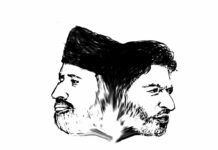Tarique Bhat
Anxiety is, quite literally, a painful response to feeling powerless against uncontrollable forces. In response, humans seek comfort, consistency and control. That’s why anxiety matters for all of us.
Anxiety is all-encompassing around us. Our political anxiety still lingers from the past but it’s not the only driver of anxiety, however, nor is it necessarily the cause of the most acutely felt anxiety in us.
Political concerns exist in the context of other fears and insecurities centered around conflict situation, military hostilities in the region, our economic affairs, natural disasters, health care, land lockedness, fewer opportunities and so on, that are driven in part by a 24×7 media environment in which bad news spreads fast and repeats endlessly. We need to understand the total picture, whether we are landlocked only, policy-locked or both.
When people are anxious, whether about their daily life, safety or health or their finances, they tend to exert more control over areas of their lives that are within their control. Often, control applies to leadership choices in all walks of life. That can be politics, economics, education, healthcare, entertainment, media, and environment, to just mention a few. This means leadership must understand their people’ anxieties and address them proactively.
Navigating common man’s anxieties is not about exploiting fear. It is about finding better ways to connect with his looking for trust, credibility and answers. Instead of solutions, our leadership is busy identifying problems. They do not only face a problem of missing charisma and highly inflated egos, but exhibit diluted energy, incoherent communication, and management by consensus. This is true to all politicians from pro-freedom to mainstream camps. A very old proverb says: “A ship of two captains sinks”, and that is exactly what is happening. Because of their ideology, history over the past decades, and inescapable positioning, leadership seems have got stuck.
It is abundantly clear that a significant majority of Kashmiris is severely disenchanted.
Our politicians build our campaign round a purely political narrative, and that also of their own contracted understanding and entrenched positions. Instead, let them also focus on many other areas of immense impact on the daily lives of the largest number of people; sectors that the vast majority of ordinary citizens have direct, immediate, and conspicuous stakes in. The clear ideas on issues that strongly resonate with ordinary people would alter the positioning of the leadership – moving it from the detached, process-driven elite with legalese rhetoric, to a policy-driven player.
Our leadership needs to get in the shoes of the people and ask, “So what do I get” which gets them to think about benefits instead of just features. When they will speak in the common man’s voice, they shall automatically become more connected. And when they will satisfy a real problem or a need, they shall become more powerful.
And if the anxiety persists, we must look for new choices to assist us in maintaining control, or at least, fostering an illusion of control.















